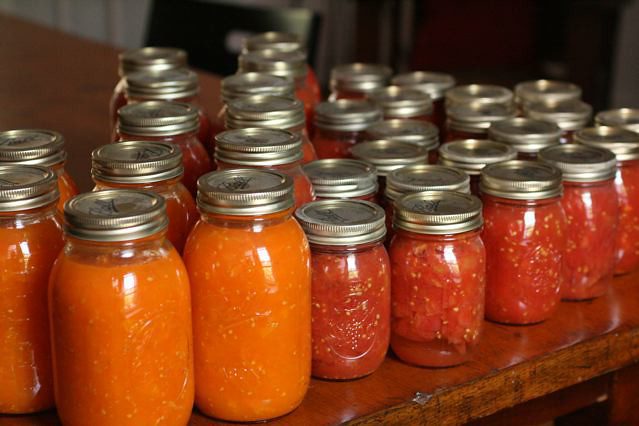In the 1860’s a tinsmith named John L. Mason invented what we now call the Mason jar -- a glass jar with a threaded lip and a metal lid secured with a reusable metal ring. Since its invention, this homemaker’s wonder has allowed people all over the world to preserve fruit, pickles, relishes and jams.
Even though people of that time didn’t know why canning kept food from spoiling, Louis Pasteur had yet to discover what we now call “germ theory”, the process was really quite simple -- heat food hot enough to kill all the germs, put a lid on the jar, secure the lid with the ring and immerse it in hot water. As the water heats the contents, the liquid expands and expels all the air out of the jar. When it cools, everything contracts and pulls the lid into an air-tight seal.
So when you learn or practice the honorable skill of canning, you are joining the ranks of millions of home canners spanning three centuries. And having joined those ranks, it is important that you pass this skill along to future generations.
Why should you can?
Many say canning is just a hobby. They argue that after all the time, energy and money spent on preserving food, you’re better off just buying canned or frozen food from the store. Leaving aside for a moment the costs of canning, there are other reasons canning is an important skill.
Taste: The foods that come from your grocery store are bred to withstand mechanical harvesting and long-term transport. They are not bred for flavor or nutrition. When was the last time you bought a decent tasting tomato at the store? It’s not the tomato’s fault. The farmers prefer tomatoes that are easier to harvest and transport even if they taste inferior. Once you've made a pot of spaghetti with your home-canned tomatoes, you'll never want to go back to store-bought again.
Chemical-free: Store bought foods are filled with chemical fertilizers, pesticides and herbicides. Not only are these bad for our health, but they’re not good for the environment either.
Safe food: You have no guarantee how safely the food at the store has been handled. We’ve all heard about the numerous food recalls due to e. Coli and other contaminants. Each of these outbreaks is due to improper handling of food. When you preserve your own food, you know that everyone handling your food has washed their hands and the food thoroughly.
Nutrition: Food at the store has been sitting on the shelves for ages. Producers hold food in reserve until price or demand makes it more profitable to bring out of the warehouse. Much of the food on grocery store shelves, like potatoes, carrots and apples, has been in storage for a year or more. The longer food sits, the more flavor and nutrition it loses.

These reasons alone make canning worthwhile. But now look at how much money canning will save you.
If you are growing or gleaning your food, the cost input is minimal. A lid costs about 30¢ and you'll need some salt, sugar, maybe vinegar and spices, depending on what you're canning. Since I'm not spending gas to go to go the grocery store, I consider the energy costs to be a wash.
So if you have an apple tree, or are able to get apples from your neighbors, a jar of apple sauce will cost you about 35¢. Same thing with green beans, carrots, peas and just about anything else growing in your garden. A jar of apple pie filling will cost about 65¢. Adding in the cost of sugar and pectin, an eight-ounce jar of jam or jelly will cost about a dollar.
But let's say, though, that you don't have a garden, or it's not producing very much. You can still buy lots of fruits and vegetables from farmer's markets or directly from the producer. You'll get 12 quarts of peaches from a lug of peaches. So even at $45 per lug, that's just $4 for a beautiful jar of peaches. A quart of peaches is the equivalent of two cans from the store, which will cost you $2.50 per can or $5 for a quart. So even when you have to buy your food, at the very worst it's break even. But most of the time it will save you.
So you save money, you get safer food and it has better nutrition and flavor. What’s not to like? If you haven’t tried your hand at it yet, now is the time to join the ranks of home canners.
Canning FAQs: https://www.providenthomecompanion.com/canning-faqs/
Print out the latest safe instructions from NDSU Extension: https://www.ndsu.edu/agriculture/extension/extension-topics/food-and-nutrition/food-preservation
Home canning videos: https://www.rrc.k-state.edu/preservation/videos.html
"do it" - Google News
August 22, 2022 at 09:47PM
https://ift.tt/wnKZb52
You CAN Do It - The Dakotan
"do it" - Google News
https://ift.tt/eDEO7LW
https://ift.tt/g1qRWD9
Bagikan Berita Ini














0 Response to "You CAN Do It - The Dakotan"
Post a Comment